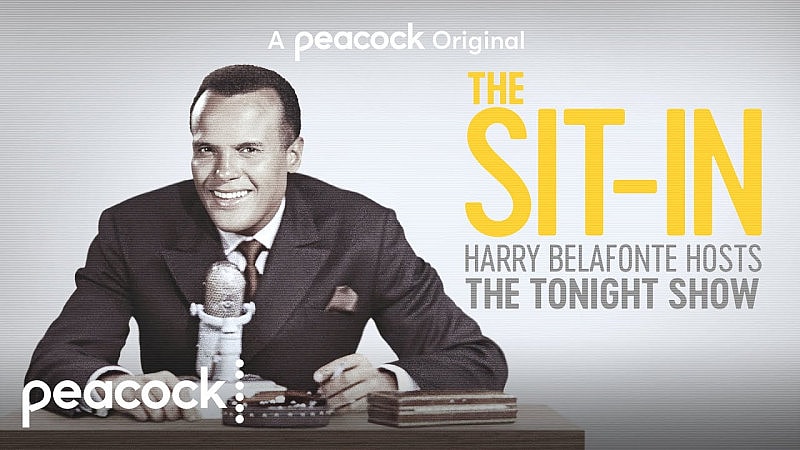To hear the American school system tell it, Black Americans have very little notable history to study or celebrate outside of slavery and its abolition. As a result, many of us have taken every opportunity to disprove that myth every day. And yet, we are still discovering new facts and events that were either swept under the rug or forgotten. Like the time Harry Belafonte hosted Johnny Carson’s The Tonight Show for a full week in February 1968.
This is especially interesting when you think about it within the context of how we continually interrogate the whiteness of late-night television. Obviously, we know about Arsenio Hall, who is rightly regarded as a pioneer with The Arsenio Hall Show. But too often this dialogue comes from a place of deficit, a frustration around the notion that there never was rather than the fact that we just need more. That’s why the Black archive is so essential and could easily have been the impetus for director Yoruba Richen’s thoughtful and fascinating documentary, The Sit-In: Harry Belafonte Hosts the Tonight Show.

All it takes is some curiosity and research to uncover clips like Belafonte, a beloved leading man and Calypso singer, chatting it up on the proverbial couch across from singers like Dionne Warwick, Petula Clark, and Buffy Sainte-Marie, actor Paul Newman, and comedians Nipsey Russell and Zero Mostel. Stemming from Joan Walsh’s 2017 The Nation article, “49 Years Ago, Harry Belafonte Hosted the Tonight Show—and It Was Amazing,” Richen takes us on a deep dive through the annals of history to detail how Belafonte came to sit in Carson’s seat amid racial unrest—and turned it into a critical social statement.
In addition to having Belafonte, now 94 years young, tell the story in his own words, Richen invited Walsh, Whoopi Goldberg, Clark, daughter Gina Belafonte, as well as archivists and historians from the Paley Center and beyond to help chronicle and contextualize the lasting significance of this event.
To paint the picture, 1968 was around the same time the FBI was doggedly investigating Martin Luther King, Jr. and it’s the year he was killed. 1968 was also 13 years into the much-protested Vietnam War and months after a group of Nazis gathered outside a theater showing Guess Who’s Coming to Dinner with racist signs. The general public was angry, dismayed, and racial tension was as high as ever. Then Belafonte gets a call from Carson, who was eager to bring on guest hosts to help diversify his platform and speak on the myriad issues at hand.
As many interviewees note in The Sit-In, Belafonte was a natural choice in that he was a widely revered performer in the vein of Sidney Poitier, and that made him a natural fit for Carson’s culturally diverse audience. But on the other hand, it was 1968 and racism was—and remains—loud and proud. Belafonte publicly worked alongside King in his efforts for racial equality and was an outspoken activist. Read: many white audiences hated seeing him on their screens, especially just moments before they went to bed, and were quick to let him know that they felt like they were being “preached to.”
The Sit-In doesn’t hide any of that and even Belafonte admits on camera that he received some abhorrent letters. Still, Richen spends the majority of the runtime exploring how Belafonte’s time on The Tonight Show was a success in spite of the hate. He made the more difficult—and potentially dangerous—decision to take this as another opportunity to merge his voice as a celebrity and artist with the voices of the moment.
“Performers can’t just sing,” he says in the film. “You had to have a point of view. You had to speak out.” So, Belafonte made it his mission to invite figures who shared his political and cultural views, who could help him teach Black and brown art to white America and, hopefully open people’s minds, and engage in an impassioned dialogue with influential figures like Robert F. Kennedy, just months before his assassination. In fact, The Sit-In suggests that it was Belafonte’s conversation with Kennedy on TV that might have swayed the somewhat conservative leader to take a closer look at race relations.
One of the most astounding revelations in The Sit-In is that Belafonte mostly acted as his own booker for his new late-night gig. Though it was clear that he was charming and could cajole the biggest skeptics, he had no real experience booking talent on a nationwide program. His name alone, however, helped get people like King, Bill Cosby and Marlon Brando on the show. Because they also wanted to make a difference.
The documentary shows that while Belafonte’s Tonight Show gig didn’t kickstart a successful late-night career for him, or even an influx of Black and brown late-night hosts, as Robin Thede and Questlove, both featured in the film, attest, it left an indelible mark on the genre of entertainment as a whole. Belafonte paved the way for people like Trevor Noah and Stephen Colbert to merge politics and late-night comedy because, as he puts it in The Sit-In, “art without content is not art.”
Have you subscribed to theGrio’s podcast “Dear Culture”? Download our newest episodes now!
TheGrio is now on Apple TV, Amazon Fire, and Roku. Download theGrio today!

